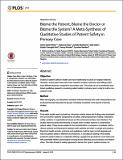| dc.contributor.author | McSharry, Jennifer | |
| dc.date.accessioned | 2016-06-03T12:33:58Z | |
| dc.date.available | 2016-06-03T12:33:58Z | |
| dc.date.issued | 2015-08-05 | |
| dc.identifier.citation | Daker-White, G,Hays, R,McSharry, J,Giles, S,Cheraghi-Sohi, S,Rhodes, P,Sanders, C (2015) 'Blame the Patient, Blame the Doctor or Blame the System? A Meta-Synthesis of Qualitative Studies of Patient Safety in Primary Care'. Plos One, 10 . | en_IE |
| dc.identifier.issn | 1932-6203 | |
| dc.identifier.uri | http://hdl.handle.net/10379/5853 | |
| dc.description.abstract | ObjectiveStudies of patient safety in health care have traditionally focused on hospital medicine. However, recent years have seen more research located in primary care settings which have different features compared to secondary care. This study set out to synthesize published qualitative research concerning patient safety in primary care in order to build a conceptual model.MethodMeta-ethnography, an interpretive synthesis method whereby third order interpretations are produced that best describe the groups of findings contained in the reports of primary studies.ResultsForty-eight studies were included as 5 discrete subsets where the findings were translated into one another: patients' perspectives of safety, staff perspectives of safety, medication safety, systems or organisational issues and the primary/secondary care interface. The studies were focused predominantly on issues seen to either improve or compromise patient safety. These issues related to the characteristics or behaviour of patients, staff or clinical systems and interactions between staff, patients and staff, or people and systems. Electronic health records, protocols and guidelines could be seen to both degrade and improve patient safety in different circumstances. A conceptual reading of the studies pointed to patient safety as a subjective feeling or judgement grounded in moral views and with potentially hidden psychological consequences affecting care processes and relationships. The main threats to safety appeared to derive from 'grand' systems issues, for example involving service accessibility, resources or working hours which may not be amenable to effective intervention by individual practices or health workers, especially in the context of a public health system.ConclusionOverall, the findings underline the human elements in patient safety primary health care. The key to patient safety lies in effective face-to-face communication between patients and health care staff or between the different staff involved in the care of an individual patient. Electronic systems can compromise safety when they override the opportunities for face-to-face communication. The circumstances under which guidelines or protocols are seen to either compromise or improve patient safety needs further investigation. | en_IE |
| dc.description.sponsorship | This study was funded by the UK National Institute for Health Research (NIHR) through a patient safety centres research grant. The funder’s web site is http://www.nihr.ac.uk/about/patient-safety-translational-research-centres.htm. | en_IE |
| dc.format | application/pdf | en_IE |
| dc.language.iso | en | en_IE |
| dc.publisher | Public Library of Science | en_IE |
| dc.relation.ispartof | Plos One | en |
| dc.rights | Attribution-NonCommercial-NoDerivs 3.0 Ireland | |
| dc.rights.uri | https://creativecommons.org/licenses/by-nc-nd/3.0/ie/ | |
| dc.subject | Primary health care | en_IE |
| dc.subject | Medical errors | en_IE |
| dc.subject | Adverse events | en_IE |
| dc.subject | Preliminary taxonomy | en_IE |
| dc.subject | Family physicians | en_IE |
| dc.subject | General practice | en_IE |
| dc.subject | Perceptions | en_IE |
| dc.subject | Ethnography | en_IE |
| dc.subject | Experience | en_IE |
| dc.subject | Management | en_IE |
| dc.subject | Psychology | en_IE |
| dc.title | Blame the patient, blame the doctor or blame the system? A meta-synthesis of qualitative studies of patient safety in primary care | en_IE |
| dc.type | Article | en_IE |
| dc.date.updated | 2016-06-02T11:00:34Z | |
| dc.identifier.doi | 10.1371/journal.pone.0128329 | |
| dc.local.publishedsource | http://journals.plos.org/plosone/article?id=10.1371/journal.pone.0128329 | en_IE |
| dc.description.peer-reviewed | peer-reviewed | |
| dc.contributor.funder | |~| | |
| dc.internal.rssid | 9427810 | |
| dc.local.contact | Jennifer Mcsharry, School Of Psychology, Ambe - Room 2061, Arts Millennium Building Extension, Nui Galway. 5754 Email: jenny.mcsharry@nuigalway.ie | |
| dc.local.copyrightchecked | Yes PLOS ONE is an open access journal. | |
| dc.local.version | PUBLISHED | |
| nui.item.downloads | 1535 | |


